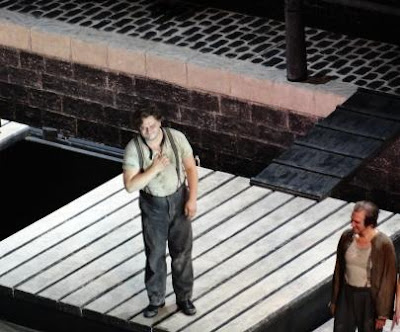(review in Engish below)
O cenário é uma longa barcaça no Sena, atracada a uma margem onde, entre ruelas escuras de tijolos (pouco parisienses na minha opinião), há uma fábrica com costureiras em laboração. Os estivadores descarregam a barcaça.
O barítono italiano Lucio Gallo foi Michele e teve uma interpretação ao nível das que já lhe ouvi. Firme, bem audível, seguro. Contudo, em cena faltou convicção na expressão do ciúme e desconfiança que o atormentam. Quando canta faz uns trejeitos com a boca, o que perturba e é inesperado, dado tratar-se de um cantor muito experiente.
Giorgetta foi interpretada pelo soprano holandês Eva-Maria Westbroek. É uma cantora que nunca desilude. Tem uma voz cheia e forte e o timbre é agradável. Cenicamente esteve bem, sem deslumbrar, mas foi muito correcta no papel.
Aleksandrs Antonenko, tenor letão, interpretou Luigi. Foi, para mim, a melhor voz desta ópera, apesar de ser mais heróica que lírica. O timbre é de beleza assinalável, sobretudo no registo mais agudo, que alcança com aparente facilidade. Teve uma presença aceitável em cena mas faltou mais expressão na paixão por Giorgetta.
Os cantores dos papeis secundários também tiveram boas prestações vocais, merecendo relevo o mezzo russo Irina Mishura e o baixo barítono inglês Jeremy White.
Apesar de uma excelente direcção musical, uma encenação de qualidade e cantores de primeira água, achei “apenas” um bom espectáculo. Faltou-lhe aquela centelha de deslumbramento …
***
IL TABARRO - Il Trittico (II of IV), Royal Opera House, London, September 2011
The scenario includes a long barge on the Seine, moored to a room where, among dark brick streets (not much Parisian in my opinion), there is a sewing factory in operation. The stevedores unload the barge.
The scenario includes a long barge on the Seine, moored to a room where, among dark brick streets (not much Parisian in my opinion), there is a sewing factory in operation. The stevedores unload the barge.
Italian baritone Lucio Gallo was Michele and sang at the high level I heard him before. He was firm, well heard and strong. However, artistically he lacked conviction in the expression of jealousy and mistrust that plagued him. When he sings he shows a “grimacing mouth”, and that is disturbing and unexpected, since he is a very experienced singer.
Giorgetta was interpreted by Dutch soprano Eva-Maria Westbroek. She is a singer who never disappoints. She has a full, strong voice and the timbre is nice. Artistically she was OK, without dazzling, but she was very correct on her performance.
Aleksandrs Antonenko, Latvian tenor, played Luigi. He was, for me, the best voice in this opera, though it is more heroic than lyrical. The timbre is of remarkable beauty, especially in the higher register, that he reaches with apparent ease. Artistically he was acceptable but lacked more passion for Giorgetta.
The singers of the secondary roles had also good vocal performances, in particular Russian mezzo Irina Mishura and British bass baritone Jeremy White.Aleksandrs Antonenko, Latvian tenor, played Luigi. He was, for me, the best voice in this opera, though it is more heroic than lyrical. The timbre is of remarkable beauty, especially in the higher register, that he reaches with apparent ease. Artistically he was acceptable but lacked more passion for Giorgetta.
Despite an excellent musical direction, good staging and top quality singers, I think this was "only" a good performance. It lacked that spark of wonder ...
***











Caro Fanático,
ResponderEliminararte é assim, não basta ser correta. É necessário deslumbrar!
A questão é que isso não se aprende na escola, é produto apenas do coração - este que tem razôes que a própria razão desconhece!
Um abraço
Puccini was absolutely right. This opera should be staged in full! The staging seems to be authentic, which these days not many opera houses could afford.
ResponderEliminarÉ isso, FanaticoUm... às vezes falta a ponta de emoção de quem canta e é essa emoção que consegue elevar a récita acima do bom banal.
ResponderEliminarDear friends,
ResponderEliminarI do agree with you, we need to be impressed by something well above "excellent" routine. And, indeed, that did not happened here, despite the high quality of the artists.
Fortunately we had still two more operas to see, and those were very different...